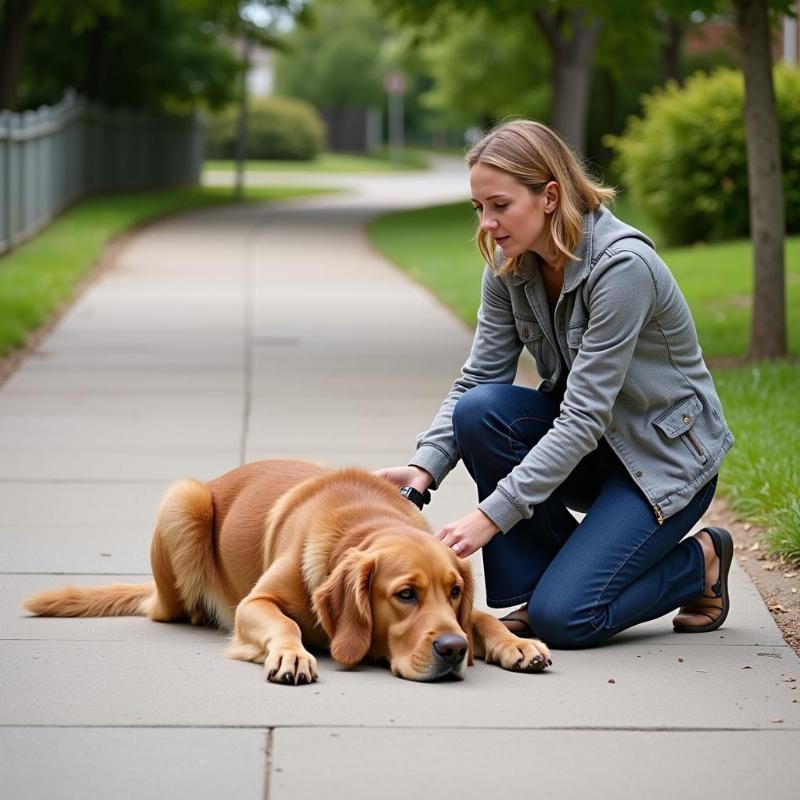Senior dog collapse can be a terrifying experience for any owner. Seeing your beloved companion suddenly lose their strength and fall to the ground is understandably alarming. But why does this happen? A number of factors can contribute to senior dog collapse, ranging from relatively benign issues to serious underlying medical conditions. Understanding the potential causes is crucial to getting your dog the appropriate care.
 Senior dog collapsing during a walk
Senior dog collapsing during a walk
Understanding the Causes of Collapse in Older Dogs
As dogs age, they become more susceptible to a variety of health problems. While some collapses can be attributed to simple fatigue or dehydration, especially after strenuous activity, others can signal a more serious issue. Some common causes include:
- Cardiovascular Issues: Heart disease, arrhythmias, and other cardiovascular problems can interfere with blood flow to the brain, causing sudden collapse. Symptoms may include coughing, difficulty breathing, and exercise intolerance.
- Neurological Disorders: Conditions like seizures, vestibular disease, and intervertebral disc disease can also lead to collapse. These conditions often present with other neurological symptoms like tremors, head tilting, and difficulty walking.
- Metabolic Diseases: Diabetes, hypoglycemia, and Addison’s disease can disrupt the body’s normal processes and lead to weakness and collapse.
- Musculoskeletal Problems: Arthritis, hip dysplasia, and other joint problems can cause pain and weakness, making it difficult for senior dogs to maintain their balance.
- Respiratory Issues: Pneumonia, bronchitis, and other respiratory infections can make it hard for dogs to breathe, potentially leading to collapse.
- Dehydration and Heatstroke: Especially during hot weather, dehydration and heatstroke can cause collapse in dogs of all ages. dog hacking after drinking water
- Toxicity: Ingesting certain toxins can also cause sudden collapse.
“Senior dog collapse is often multifactorial,” explains Dr. Emily Carter, DVM, “Meaning there might be more than one underlying issue contributing to the problem. A thorough veterinary examination is essential to pinpoint the cause.”
What to Do If Your Senior Dog Collapses
If your senior dog collapses, remain calm and take the following steps:
- Check for Breathing and Pulse: Ensure your dog is breathing and has a pulse.
- Keep Your Dog Cool and Comfortable: If possible, move your dog to a cool, shaded area.
- Contact Your Veterinarian Immediately: Describe the events leading up to the collapse, any accompanying symptoms, and your dog’s current condition.
- Transport Your Dog to the Vet Safely: If your veterinarian advises, carefully transport your dog to the clinic. Avoid sudden movements that could exacerbate any injuries. my dog is breathing too fast
Diagnosing the Cause of Collapse
Your veterinarian will perform a comprehensive physical exam and likely recommend additional tests, such as:
- Blood work: To assess organ function and screen for metabolic diseases.
- Urinalysis: To check for infections and other abnormalities.
- X-rays and Ultrasound: To evaluate the heart, lungs, and other internal organs.
- Electrocardiogram (ECG): To assess heart rhythm.
- Neurological examination: To assess nerve function.
Preventing Senior Dog Collapse
While not all causes of collapse are preventable, you can take steps to minimize the risks for your senior dog:
- Regular Veterinary Checkups: Early detection of underlying health problems is key.
- Maintain a Healthy Weight: Obesity can exacerbate many health conditions.
- Provide a Balanced Diet: A nutritious diet supports overall health and well-being.
- Regular Exercise: Appropriate exercise helps maintain muscle strength and joint health.
- Avoid Overexertion: Especially during hot weather.
- Monitor for Changes in Behavior: Be alert for any signs of illness, such as lethargy, decreased appetite, or changes in gait.
“Proactive care is crucial for senior dogs,” advises Dr. Carter. “Regular checkups, a healthy lifestyle, and close monitoring can help identify potential problems early on and improve your dog’s quality of life.”
Conclusion
Senior dog collapse can be a frightening experience, but by understanding the potential causes and taking appropriate action, you can help your beloved companion receive the necessary care. Regular veterinary checkups, a healthy lifestyle, and vigilant monitoring are essential to ensuring your senior dog’s well-being.
FAQ
- What are the most common reasons for a senior dog to collapse? Cardiovascular disease, neurological disorders, and metabolic problems are among the most common causes.
- Should I take my dog to the vet if they collapse? Yes, always consult a veterinarian immediately if your dog collapses.
- Can collapse in senior dogs be prevented? While not all causes are preventable, maintaining a healthy lifestyle for your senior dog can minimize risks.
- What tests will the vet likely run if my dog collapses? Blood work, urinalysis, X-rays, ultrasound, and ECG are common diagnostic tools.
- What should I do while waiting for the vet if my dog collapses? Check breathing and pulse, keep the dog cool and comfortable, and contact your veterinarian immediately.
- Is collapse always a sign of a serious problem in senior dogs? Not always, but it’s essential to rule out serious underlying conditions.
- How can I make my senior dog more comfortable if they are prone to collapsing? Provide a supportive environment, avoid overexertion, and maintain regular veterinary checkups.
Beautdogs.us is your premier source for all things dog-related in the US. We offer expert advice on dog breeds, care, and lifestyle. Whether you’re a new dog owner or a seasoned pro, Beautdogs.us provides trustworthy information to ensure a happy, healthy life for your canine companion. We cover everything from breed specifics to nutrition and training, empowering you to be the best dog parent you can be. Learn more about our services and connect with our team of experts today! Email us at [email protected] or call us at +1 501-555-7529.